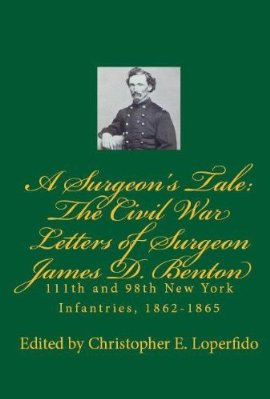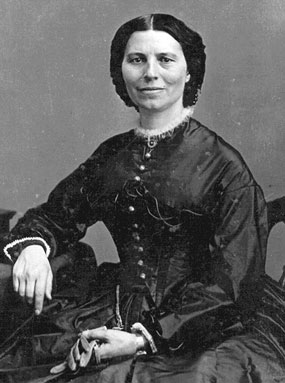A Surgeon’s Tale: The Civil War Letters of Surgeon James D. Benton, 111th and 98th New York Infantries, 1862-1865 edited by Christopher E. Loperfido. Ten Roads Publishing, 2011. Paper, ISBN: 0982527578. $13.95.
 The American Civil War was a veritable bloodbath for the men who waged it. More than 400,000 Billy Yanks were wounded throughout the conflict—245,000 of those casualties were gunshot wounds. Over 300,000 Union soldiers died as a result of the war, two-thirds of them struck down ingloriously by dysentery, malaria, and influenza. Thousands of regular army and contract surgeons struggled to keep the wounded and sick soldiers alive. Yet, the letters and diaries of the regular soldiers have greatly overshadowed the voices of these surgeons. Christopher E. Loperfido attempts to shed light on the voice of one such surgeon, James D. Benton, who was an assistant surgeon with the 111th New York Volunteer Infantry and a surgeon with the 98th New York Volunteer Infantry. Loperfido, who currently works for the Department of Homeland Security, was perusing the archives of the Old Brutus Historical Society in Weedsport, New York, in summer 2008, when he discovered the letters.
The American Civil War was a veritable bloodbath for the men who waged it. More than 400,000 Billy Yanks were wounded throughout the conflict—245,000 of those casualties were gunshot wounds. Over 300,000 Union soldiers died as a result of the war, two-thirds of them struck down ingloriously by dysentery, malaria, and influenza. Thousands of regular army and contract surgeons struggled to keep the wounded and sick soldiers alive. Yet, the letters and diaries of the regular soldiers have greatly overshadowed the voices of these surgeons. Christopher E. Loperfido attempts to shed light on the voice of one such surgeon, James D. Benton, who was an assistant surgeon with the 111th New York Volunteer Infantry and a surgeon with the 98th New York Volunteer Infantry. Loperfido, who currently works for the Department of Homeland Security, was perusing the archives of the Old Brutus Historical Society in Weedsport, New York, in summer 2008, when he discovered the letters.
A Surgeon’s Tale raises several intriguing questions for historians of Civil War medicine. Benton administered care to Union soldiers for three years and was involved in combat at Harper’s Ferry, Gettysburg, the Wilderness, Spotsylvania, Cold Harbor, and Petersburg. When measured against several of the finest primary sources of Civil War medicine, such as the Personal Memoirs of John H. Brinton: Civil War Surgeon, 1861-1865, and A Surgeon’s Civil War: The Letters and Diary of Daniel M. Holt, M.D., A Surgeon’s Tale is much better at posing interesting questions than it is at answering them. It certainly is not because James D. Benton was uninteresting or dull. Quite the opposite, in fact. Benton was a lively commentator that gave voice to many of the common experiences of the war. He penned 42 letters to his wife and his parents between 1862 and 1865. Most of the letters surprisingly resemble a private soldier’s letters more than a surgeon’s. Many of them deal with experiences such as illness, hunger, boredom, war news and rumors, homesickness, politics, and pay. The few times Benton did specifically comment on his position, he illuminated the unique—and sometimes dangerous—role that assistant surgeons played in the war. Benton also shed light on the treatment of disease which, due to an imperfect understanding of contagion and infection, was inconsistent and often haphazard.
Loperfido has arranged Benton’s letters chronologically, from the first letter James sent to his father in August 1862, to the last letter he sent relating to the war in 1885. James D. Benton was born on July 22, 1837, in Ira, New York. His father, Allen Benton, was a physician, and James followed in his footsteps—likely attending Albany Medical College. In August 1862, James left Ira for Auburn, New York, to join the Army. James enlisted late because he was not influenced by nationalism; instead he believed the military would be a good avenue to make money to support his wife Maggie and young daughter Jessie. He was mustered in as an assistant surgeon of the 111th New York Volunteer Infantry. Similar to soldiers, surgeons felt anxiety before a conflict. James gave interesting insight into the pre-combat anxieties of Civil War surgical staff. “It starts a little chill occasionally to hear the long roll at dead of night and get out bandages and instruments to bind up the wounds,” James wrote. “It makes a fellow feel rather curious at first but he soon is accustomed to it” (41-42). Unlike surgeons, assistant surgeons accompanied pickets on duty, and established field hospitals near the battle line. They were in considerably more danger than surgeons. James wrote to his father regarding his unique duty: “You seem to be somewhat astonished that the doctors have to do picket duty…every day a surgeon is sent out in charge of the picket of each Division and stays until relieved by his successor” (72-73).
James Benton also wrote about the diseases he frequently encountered and his treatment of those diseases. Diarrhea and dysentery were the most common ailments that he and the soldiers were forced to endure and James makes note of diarrhea several times in his letters. The treatment of disease consisted primarily of surgeons liberally dosing sick soldiers with compounds that were often toxic, such as calomel, which caused symptoms of mercurial poisoning that included vomiting, diarrhea, and excessive salivation. James rejected calomel and was instead a proponent of Aconite. Aconite was an extract that was listed on the standard supply table for surgeons adopted in 1863 and was used until the mid-twentieth century. Aconite extract was also toxic but not deadly in small doses, and James wholeheartedly believed that Aconite was beneficial to a sick soldier. Unfortunately, he only mentions the use of Aconite twice throughout his correspondence.
A Surgeon’s Tale is very interesting and would intrigue anyone interested in the Civil War experience. James Benton’s letters raise several important issues for scholars of Civil War medicine to pursue. They seem to suggest that the experience of assistant surgeons was much different than the experience of surgeons. How true might this have been? How widespread was the use of Aconite extract during the war? How many physicians became involved in the war effort for money versus those who volunteered patriotically? Loperfido has done a fine job putting together the letters for publication. That said, I was surprised by several small editorial mistakes, such as the use of succeeding instead of the correct term, seceding. Additionally, Loperfido largely failed to reference some of the major authors of the history of medicine and the Civil War, such as George Worthington Adams, Paul Steiner, Frank R. Freemon, and Alfred J. Bollet. Overall, however, anyone interested in a quick read of an intriguing set of letters from the Civil War will likely enjoy A Surgeon’s Tale.
Dillon Carroll is a Ph.D. Candidate in History at the University of Georgia.
